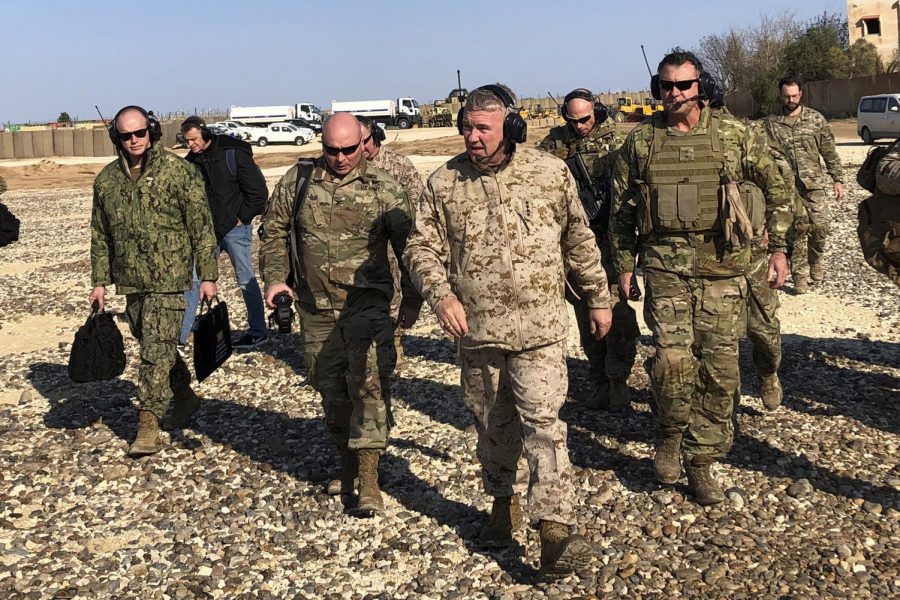Ending U.S. involvement in Syria
President Trump’s withdrawal of U.S. troops – progress or oversight?
Gen. Frank McKenzie, center front, the top U.S. commander for the Middle East, walks as he visits a military outpost in Syria, Saturday, Jan. 25, 2020. McKenzie made the unannounced visit to Syria, traveling to five different military outposts to meet with troops, hear from commanders and talk with the leader of the Syrian Democratic Forces. (AP Photo/Lolita Baldor)
January 31, 2020
American involvement in Middle Eastern affairs has been a bolstering point of controversy for the United States government for the better part of the last 50 years. This not only sprung immediate conflict, but a full-on civil war amongst the Syrian people, forcing many into many chaotic, and even deadly, events from both the Assad regime and other regimes in the region.
This caught the attention of the Russian government, which in 2015, began backing Syria as a proxy through military aid and political power to suit their strategic interests in the region. The United States, by extension, began aiding, training, and providing hegemonic power to pro-democracy rebels. This decision was made by then President Barack Obama, where the United States Central Intelligence Agency was directed to lead the operations through a $1 billion annual allocation in hopes to curb Syrian political expansion in the region and to thwart Russia’s Middle Eastern legitimacy. It was later found through the publication of the Wikileaks documents regarding Syria that the Obama administration was seeking regime change in the region, resembling our actions taken against former President of Iraq Saddam Hussein.
Involvement in Syria by the United States has been a controversial one. While many see our involvement as a humanitarian effort, others claim that it is just another case of America longing to be the “world’s policeman” in attempting to insert itself into affairs that do not, in the top-down sense, regard them at all. While either take on the subject may hold truth to some degree, there is undeniable evidence that the reason behind our initial involvement was not exactly transparent. This soon fed into fiery political rhetoric by leaders on both sides of the aisle, most notably President Donald Trump’s, whose recent action has been yet another installment in the saga of the controversy of Syrian occupation, where on October 13, 2019, it was announced that all troops in Northern Syria would be withdrawn. This not only fulfilled a key campaign promise from the president, but also led to a stir from those on the neoconservative right and neoliberal left that felt the decision was a poor one, particularly due to a “betrayal” of our relationship with our political proxy in the region, Syrian Kurdish forces, who we had been fighting alongside for the last three years. This is because along with the President’s decision, he made explicit that Turkish forces would help solidify the void left by the lack of U.S. forces in an effort to conclude American involvement.
This drew panic by many in the pro-Kurd lobby, due to a continuing conflict between the Kurds and the Turks, sparking in the late 1970s, that has led to the deaths of over 30,000 people. This has led to the designation by the Turkish government that labels the pro-democracy forces within the ethnic minority, the Kurdistan Workers’ Party, a “terrorist group”, fueling the fear that Turkish-led involvement would lead to the ultimate demise of our Kurdish “allies” in the region that were responsible for fighting the authoritarian Assad regime.
So, was the President’s decision a progressive move towards ending global conflict? Or was it rather an oversight in judgment reached by the dire need to fulfill a key campaign promise? I tend to look at it in the realm of popularity amongst the American electorate. According to Pew Research Center, the country is essentially split on whether or not the decision would be a good one, with 43% saying it would be the right move, and 45% saying it would not be the right move. With this in mind, it is important to ask the question: is it beneficial to U.S. national security, legitimacy, or hegemony to have involvement in Syria? While many claim we should “finish what we started”, it is important to recognize both the financial and moral toll such a conflict can have on a nation, especially in a conflict that does not have a clear cut benefit to us as a country. While many of our allies in the region benefit from the Syrian conflict, such as Saudi Arabia and Israel, the United States possesses no surface-level strategic gain – especially when our allies’ involvement is minimal if not nonexistent in such conflicts. As for our involvement in other Middle Eastern territories, such as Iraq, Iran, Afghanistan, Pakistan, Israel, Libya, and Turkey, the same question can be asked. As we dump billions of dollars in aid, resources, and practices into these areas in order to fuel conflicts and commitments that provide very little benefit to us, I feel that U.S. national security is rather damaged, not helped. In an era where we involve ourselves in the world’s affairs more so than our own affairs here at home, it is important that we recognize what detrimental impact such intervention can have on our own legitimacy, resources, citizens, and security, as a result. As for the Kurds, as many are angered by our “betrayal”, I feel that it should be also kept in mind that many of our closest allies, including Japan, Australia, Spain, and Germany, deem the Kurdistan Wokers’ Party a terrorist organization and have fallen victim physically and strategically to their actions in the past, despite our support of them. Although pro-democracy, their course of action sooner resembles that of an adversary towards Western idealism, and that our support of them was simply a result of the old “enemy of my enemy is my friend” adage.
All in all, I support the President’s decision, and believe that our involvement in Middle Eastern affairs has been disastrous. While I am a proponent of peace in most cases, I feel that any conflict that we do involve ourselves with should strategically, politically, or securely benefit the United States in some way, shape, or form. And traditionally speaking, our current Middle Eastern situation does not meet the criteria needed for a just war.







